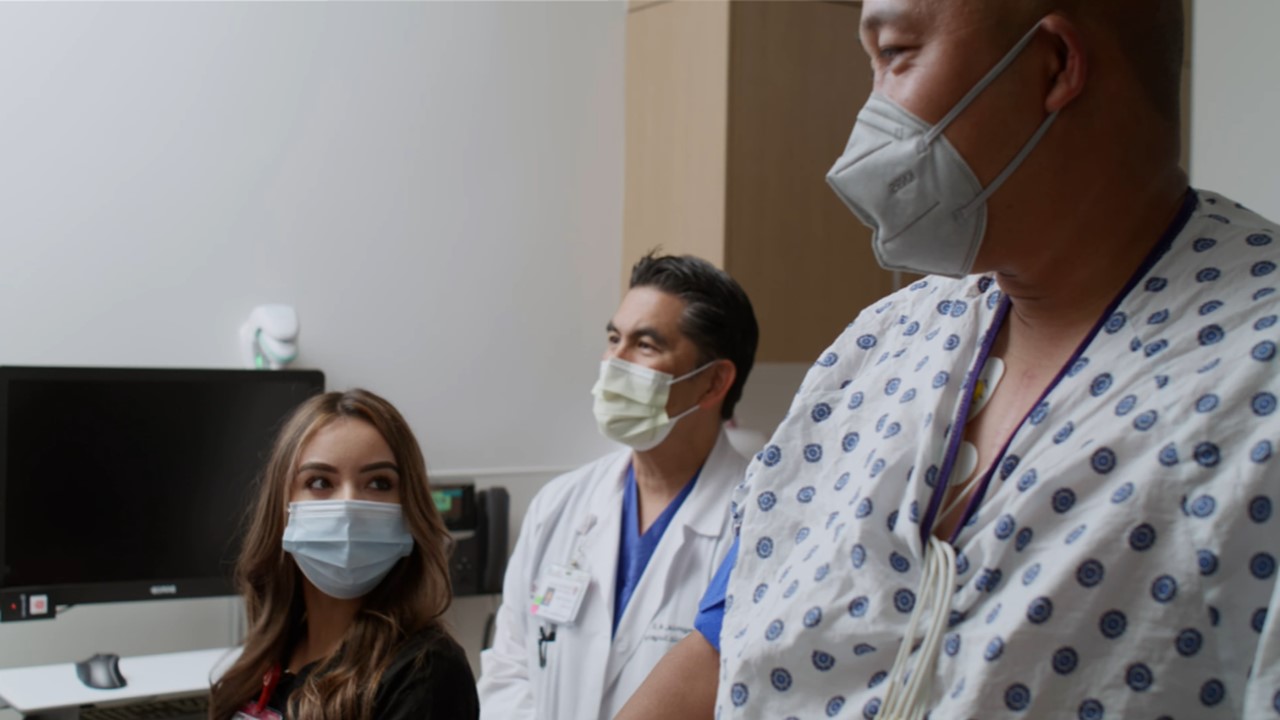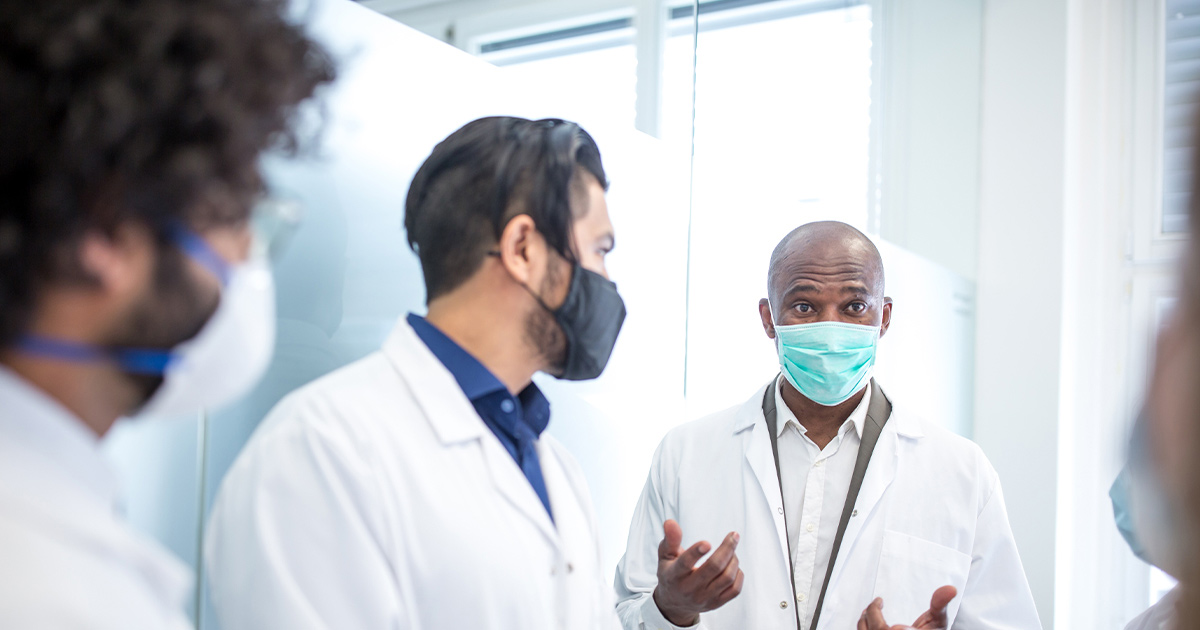Heart & Vascular Clinic Pleasanton
Part of Cardiovascular Health

Leaders in Cardiovascular Care
At the Heart & Vascular Clinic Pleasanton, you receive complete, compassionate care from Stanford Medicine doctors in a convenient Tri-Valley location. As global leaders in cardiovascular research and innovation, we bring you the most advanced treatments available.
5565 W. Las Positas Blvd.
Suite 150
Pleasanton, CA 94588
What We Offer You for Heart and Vascular Clinic
- Specialized expertise in treating all cardiovascular disorders, including artery disease, arrhythmias, valve issues, heart failure, and vascular diseases. Go to Conditions Treated
- Full range of cardiovascular tests and monitoring technology for precise diagnoses and successful treatments. Go to Testing and Monitoring
- Excellent outcomes with conventional and advanced treatments, including minimally invasive procedures and open surgery. Go to Treatments
- Leadership in pioneering next-level cardiovascular techniques and technology to make treatments safer and more effective. Go to Innovation Highlights
- Comprehensive care and support services delivered by people who are passionate about improving your quality of life. Go to Care Team
- Easily accessible care in our convenient Pleasanton location or from home through video visits. We accept most insurance plans, and financial assistance is available. Go to Connecting to Care
Our team of specialists work together to treat all conditions affecting the heart and blood vessels, from common to complex. We provide in-depth evaluations and advanced, personalized treatments for:
Heart Rhythm Disorders
Aorta Conditions
- Abdominal aortic aneurysm
- Aortic dissection
- Thoracic aortic aneurysm
Artery Conditions
- Arteriovenous (AV) fistula
- Atherosclerosis
- Carotid artery disease (carotid stenosis)
- Claudication
- Coronary artery disease
- Mesenteric ischemia
- Peripheral vascular disease (PVD)/peripheral arterial disease (PAD)
- Popliteal artery aneurysm
- Renal vascular disease/renal artery stenosis
Vein Conditions
- Chronic venous insufficiency
- Pelvic congestion syndrome and uterine fibroids
- Varicose veins
Blood Clots and Blockages
- Deep vein thrombosis (DVT)
- Pulmonary embolism
- Thoracic outlet syndrome (TOS)
Wounds
- Chronic wounds and ulcers that won’t heal due to poor blood flow.
Other Conditions
Esophagus
- Achalasia
- Barrett’s esophagus
- Benign esophageal tumors and cysts
- Esophageal and gastroesophageal (GE) junction cancer
- Esophageal diverticulum
- Esophageal perforation
- Gastroesophageal reflux disease (GERD)
- Paraesophageal and hiatal hernia
Chest wall
- Chest wall tumors
- Chest wall hernias
- Pectus excavatum
- Sternoclavicular joint disorders
Diaphragm
- Diaphragmatic paralysis and eventration
- Diaphragmatic hernias (Morgagni, Bochdalek)
Lung and pleura
- Emphysema
- Large-cell neuroendocrine cancer
- Lung cancer
- Lung metastasis
- Malignant or recurrent pleural effusion
- Malignant pleural mesothelioma (MPM)
- Mesothelioma
- Pulmonary nodules
- Pulmonary sequestration
- Pulmonary infection and empyema
- Spontaneous pneumothorax
Mediastinum (area between the lungs)
- Hyperhidrosis
- Myasthenia gravis
- Mediastinal cysts
- Mediastinal tumors
- Mediastinitis
- Pericardial effusion or tamponade
- Refractory tachyarrhythmias
Trachea (windpipe)
- Tracheobronchomalacia (TBM)
- Tracheal stenosis
Heart Testing
Our goal is to ensure you receive the most accurate diagnosis as quickly as possible, so we can provide the right treatment right away. Advanced technology and diagnostic techniques enable us to pinpoint the cause of your condition and tailor a care plan to treat it. Heart testing options include:
- Cardiac catheterization: During this procedure, an interventional cardiologist inserts a catheter (narrow, hollow tube) with specialized tools into your artery to evaluate your blood pressure and blood vessels.
- Computed tomography (CT) scan and magnetic resonance imaging (MRI): Pictures from these scans help us see your arteries, blood vessels, and heart structures.
- Echocardiogram: This type of ultrasound creates precise pictures of your heart without radiation.
- Electrocardiogram (EKG): This test records your heart’s electrical impulses to assess heart rhythm, chamber size, and heart muscle thickness.
- Laboratory tests: Blood tests check for infection and measure cholesterol, white blood cell counts, and other measures of heart health.
- Nuclear medicine: Small amounts of radioactive material (tracer) help us track blood flow and check for heart disease.
- Stress test: We do an EKG while you exercise to see how well your heart works during physical activity.
- Ultrasound: This test uses sound waves to create images of blood vessels, tissues, and organs.
Vascular Testing
Our on-site vascular lab provides leading-edge, noninvasive diagnostic testing that ensures high-quality results. Expert vascular technologists perform tests such as:
- Computed tomography (CT) scan and magnetic resonance imaging (MRI): Pictures from these scans help us see your arteries, blood vessels, and heart structures.
- Indirect, non-imaging testing: Tests such as ankle-brachial index (ABI) evaluate factors like blood pressure to help determine vascular health.
- Laboratory tests: Blood tests check for infection and measure cholesterol, white blood cell counts, and other indicators of vascular health.
- Nuclear medicine: Small amounts of radioactive material (tracer) help us track blood flow and check for vascular disease.
- Ultrasound: This test uses sound waves to create images of blood vessels, tissues and organs.
Your cardiovascular team collaborates to develop a treatment plan that’s customized for you. We offer the full range of treatments, prioritizing diet and exercise, medication, and noninvasive and minimally invasive techniques, whenever possible.
If you need surgery, our team uses the safest and most effective techniques, equipment, and technology available. We are also leaders in redo cardiac surgery and bloodless cardiac (transfusion-free) surgery.
Take a Virtual Visit
See our spacious Heart & Vascular Clinic equipped with the latest advancements in cardiovascular testing and treatments.
Heart Treatments
Heart Monitoring
We use next-level devices to monitor your heart’s rhythm and correct any abnormalities when necessary. Our monitoring technologies include:
- Heart monitor: Wearable monitors that measure your heart rhythm during your daily activities over several days or weeks
- Implantable heart failure monitor: Tiny implant that remotely monitors blood pressure changes in your pulmonary artery, providing an early signal of worsening heart failure
- Implantable loop recorder (ILR): Small implant (about the size of a paper clip) that continuously monitors your heart’s rhythms to help understand reasons for palpitations or fainting spells
Heart Rhythm Procedures
We treat arrythmias (irregular heartbeat) with numerous leading-edge procedures, including:
- Catheter ablation: This minimally invasive procedure treats a specific area of heart tissue that is causing an irregular heartbeat.
- Cardioversion: This procedure uses a controlled, low-energy electrical shock to restore a normal heart rhythm.
- Maze procedure: We use either an open-heart (Cox-maze IV) or minimally invasive (TT Maze) procedure to create scar tissue on your heart. This tissue interrupts abnormal electrical signals that are causing atrial fibrillation.
Heart Transplant Evaluation
We evaluate patients for a heart transplant in coordination with Stanford Health Care’s world-renowned Heart Transplant Program at our main campus. We also offer the Mechanical Circulatory Support Program that helps your heart function while you wait for a heart transplant.
Heart Valve Procedures
Our innovative surgical valve repair and replacement procedures include:
- Natural heart valve repair: Your surgeon uses your own healthy heart tissue to rebuild your valves.
- Transcatheter aortic valve replacement (TAVR): We use a catheter (a narrow, hollow tube) to replace your aortic valve without open-heart surgery.
- Transcatheter mitral valve repair (TMVR): This minimally invasive catheter procedure is an alternative to open-heart surgery for repairing a leaky mitral valve. It uses a special device called the MitraClip™.
Structural Heart Surgery
We treat conditions and diseases related to the heart’s anatomy with the most advanced procedures, including:
- Congenital heart surgery: These procedures correct structural heart problems present at birth.
- Left ventricular remodeling/surgical ventricular restoration: Our surgeons perform this procedure to restore the heart’s natural shape after a heart attack.
- Myectomy and myotomy: This open-heart surgery removes a thickened heart wall to treat hypertrophic cardiomyopathy.
- Transmyocardial revascularization (TMR): Our surgeons use lasers to create small holes in heart muscle to relieve angina or chest pain by improving blood flow to the heart.
- Tumor removal: We use advanced surgical techniques to remove tumors from the heart.
Vascular Treatments
Aneurysm and Aortic Dissection Repair
Our vascular surgeons are skilled in numerous vascular repair techniques, including:
- Aortic aneurysm repair: We use open surgery to repair an aneurysm in the aorta, either in the chest (thoracic aortic aneurysm open repair) or abdomen (abdominal aortic aneurysm open repair).
- Aortic dissection repair: In this surgery, we replace the torn part of the aorta with a graft (artificial blood vessel).
- Endovascular aneurysm repair (EVAR): Also called endovascular stent grafting, we use this minimally invasive procedure to repair an aneurysm through a small incision in the groin.
Arteriovenous (AV) Fistula Repair
- Minimally invasive surgery that uses a catheter to reach the fistula, and a stent or type of glue to repair it.
Bypass Surgery
When a blood vessel is damaged, surgeons may replace it with a piece of a different healthy blood vessel. Bypass procedures include:
- Coronary artery bypass graft (CABG) surgery: Surgeons restore blood flow to the heart by bypassing a blocked or narrowed coronary artery with a piece of another blood vessel, usually a vein from the leg.
- Femoral popliteal (Fem-Pop) bypass surgery: This procedure restores blood flow through the femoral artery (leg’s main artery).
- Lower extremity revascularization: This vascular bypass surgery restores blood flow in the legs to prevent limb loss (limb salvage).
Percutaneous Coronary Intervention (PCI)
This type of procedure opens blocked or narrowed blood vessels. Surgeons may place a stent (tiny coil) to keep the blood vessels open. PCI options include:
- Balloon angioplasty: We place a tiny balloon inside a blood vessel and expand it to open the blood vessel.
- Carotid artery angioplasty: This procedure opens the carotid artery to restore blood flow to the brain.
- Hybrid coronary revascularization: This procedure combines coronary artery bypass graft (CABG) surgery and angioplasty with stenting to treat coronary artery disease.
- Laser angioplasty: Our surgeons use a laser to vaporize blockages in arteries.
Procedures to Prevent or Remove Blood Clots or Blockages
- Atherectomy: Surgeons use a catheter with a laser or blade on the end to remove plaque from blood vessels.
- Carotid endarterectomy: This is an open surgery to remove plaque and clots from the carotid arteries in the neck.
- Intravascular lithotripsy: We use shock waves to break up calcium deposits inside blood vessels. This helps reduce blockages and allows surgeons to place a stent to hold blood vessels open.
- Percutaneous thrombectomy: Doctors use a catheter and specialized tools to break up or remove an embolism.
- Thoracic outlet decompression surgery: This procedure treats thoracic outlet syndrome by removing or releasing structures that compress the artery, vein, or nerve.
- Thrombolysis: We dissolve or remove blood clots using medication or a catheter-based procedure.
- Transcarotid artery revascularization (TCAR): This procedure allows your doctor to treat a narrowed carotid artery while reducing your risk of stroke.
- Vena cava filter: We place a filter in the inferior vena cava (your body’s largest vein) to prevent blood clots from reaching your heart or lungs.
Varicose Vein Treatments
We offer the full range of treatments for varicose veins, including:
- Sclerotherapy: Doctors inject solutions into varicose veins to make them less noticeable.
- Transilluminated powered phlebectomy: We insert a light source into the tissue to see varicose veins and then use a catheter to remove them.
- Vein stripping: This surgical procedure removes varicose veins.
- Venous ablation: We use lasers or radiofrequency waves to close varicose veins.
Kidney (Renal) Failure Treatment
Dialysis is a procedure that removes waste substances and fluid from your blood when your kidneys can no longer perform that function.
Wound Care
We treat underlying vascular problems (such as peripheral vascular disease) to restore blood flow to extremities, helping chronic wounds heal. One of our many approaches is subfascial endoscopic perforator surgery that helps treat ulcers. Our doctors emphasize limb preservation and salvation using a variety of clinical treatments, therapies, and support services.
THORACIC TREATMENTS
Lung cancer and other thoracic cancers require expert care. At Stanford Health Care Tri-Valley thoracic surgery, our multispecialty team of lung and thoracic cancer specialists has been at the forefront of performing lung-sparing surgeries, inventing radiation therapy techniques, and leading clinical trials resulting in new treatment paradigms.
Surgery may be the only treatment, or in some cases part of the treatment, for early-stage lung cancers. Treatment for thoracic cancer may include one or more of the following:
Esophageal Surgeries
- Esophagectomy: The surgical removal of the lower two-thirds or nearly the entirety of the esophagus, along with the uppermost part of the stomach, and all of the surrounding lymph nodes
- Ivor Lewis esophagectomy: Surgical removal of the esophageal tumor through an abdominal incision and a right thoracotomy
- Minimally invasive esophagectomy: Surgical removal of the esophageal tumor through small abdominal incisions and small incisions in the right chest (thoracoscopy)
- Three-incision esophagectomy: Surgical removal of the esophageal tumor through an abdominal incision, right thoracotomy, and left neck incision
- Transhiatal esophagectomy: Surgical removal of the esophageal tumor through abdominal incision, without thoracotomy, and a left neck incision
Lung Surgeries
- Bronchial stenting: Stents are used to open up airways and make breathing easier
- Lobectomy: This procedure involves the anatomic removal of a complete lobe of the lung (there are three lobes in the right lung and two in the left lung). This is the most common operation and has very low complication and mortality rates
- Lung volume reduction surgery (LVRS): This is a surgical treatment for emphysema that could dramatically improve symptoms and, in many cases, increase longevity
- Pneumonectomy: This surgery involves a complete removal of the lung on one side. Although sometimes required, one would like to avoid this if a complete removal of the cancer can be performed without pneumonectomy
- Pulmonary metastasectomy: Patients with metastatic tumors that spread to the lung from other sites can still have a chance to be cured by surgical removal of these tumors, often when combined with chemotherapy
- Sleeve lobectomy: This surgery removes a complete lobe of the lung, as well as part of the airway that conducts air to the remaining lobe. After the removal of the lobe and part of the airway, the remaining lobe is reconnected to the airway
- Segmentectomy: This involves the surgical removal of a portion of the lobe and is often used for small tumors or in patients with severe lung disease
From performing the nation’s first adult heart transplant in 1968 to completing the first beating-heart mitral valve repair in the Western U.S., Stanford Health Care continues to define what’s next in cardiovascular care.
Other groundbreaking cardiovascular innovations include:
- A Stanford Medicine cardiothoracic surgeon serving patients in Pleasanton developed the minimally invasive TT Maze (totally thoracoscopic) procedure for AFib, now used worldwide.
- Stanford Health Care was the first health system in Northern California and the second in the state to offer the groundbreaking transcatheter aortic valve replacement (TAVR) procedure.
- Our Pleasanton location offers transcarotid artery revascularization (TCAR), a revolutionary procedure that allows your doctor to treat a narrowed carotid artery while reducing your risk of stroke.
Your Care Team
When you entrust us to your care, you have access to a wide range of top heart specialists and advanced practice providers all working in Pleasanton. We partner with your doctor to provide coordinated, seamless care.

Your Doctors
Cardiologists
Cardiologists are doctors who have advanced training in diagnosing and treating heart diseases.
View All {0} Cardiologists »Adult Congenital Heart Disease Cardiologist
Adult congenital heart disease cardiologists specialize in treating adults who were born with heart defects.
View All {0} Adult Congenital Heart Disease Cardiologists »Heart Failure Cardiologists
Heart failure cardiologists have advanced training in heart failure and treat people whose heart failure no longer responds to traditional therapies.
View All {0} Heart Failure Cardiologists »Interventional Cardiologists
Interventional cardiologists are specially trained cardiologists who provide treatments that use thin tubes called catheters to access your heart.
View All {0} Interventional Cardiologists »Electrophysiologists
Electrophysiologists are doctors who specialize in diagnosing and treating irregular heart rhythms.
View All {0} Cardiac Electrophysiologists »Vascular Surgeons
Vascular surgeons specialize in treating vascular diseases (affecting the blood vessels) through a variety of advanced surgical and nonsurgical options.
View All {0} Vascular Surgeons »Cardiothoracic Surgeons
Cardiothoracic surgeons are doctors who specialize in surgical procedures to treat conditions of the heart, lungs, and other organs of the chest.
View All {0} Cardiothoracic Surgeons »Thoracic Surgeons
Thoracic surgeons treat conditions of the chest, including the esophagus, lungs, and mediastinum.
View All {0} Thoracic Surgeons »Advanced Practice Provider
Advanced practice providers are health professionals, such as physician assistants and nurse practitioners, who practice medicine under a doctor's supervision. They can perform routine exams, order lab work and X-rays, prescribe medicines, and counsel people about their health.
View All Advanced Practice Providers »
Support Services
At Stanford Health Care, we know that physical health and emotional well-being go hand-in-hand. You have access to vast support services, including cardiac rehabilitation, genetic counseling, personalized nutrition plans, and support groups. We also offer psychological support services specifically designed for people with heart conditions. Go to Support Services.
At the Heart & Vascular Clinic Pleasanton, our team makes it easier for you to receive our care. We offer:
For Referring Physicians
PHYSICIAN HELPLINE
Fax: 650-320-9443
Monday–Friday, 8 a.m.–5 p.m.
Stanford Health Care provides comprehensive services to refer and track patients, as well as the latest information and news for physicians and office staff. For help with all referral needs and questions, visit Referral Information.
You may also submit a web referral or complete a referral form and fax it to 650-320-9443 or email the Referral Center at ReferralCenter@stanfordhealthcare.org.
